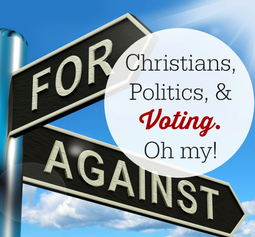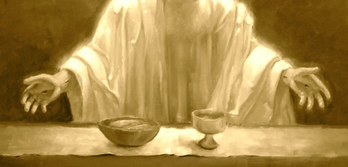The goal of redemptive history is the cosmic restoration of creation. This is the story of the Bible. This is the church’s story. This should be your church's story. God has determined to use a redeemed people to herald this message. The ekklesia of Jesus, the gathered-church, composed of redeemed and restored people, living out the gospel, illustrating this cosmic restoration through its treasonous worship of the risen Jesus, the Lord over all other claims to the throne, its missional behavior to its neighbors, and , particularly, through the fellowship of restored human relationships among strangers and unequals. The gathered-church of the Lamb of God is unlike any and all other rebellions and resistance movements: church is not (ever) aligned with a government or party or state or king in order to violently overthrow or by means of State-authority and any form of violence to maintain; church is never (ever) aligned with the spilling of blood through strength or cunning to change or maintain the status quo of an unredeemed social structure or cultural state of affairs; and, where privileged to participate, church does not count on the ballot-box to overthrow power or maintain a particular person or party in power. The church uses a table of fellowship over food, broken bread, and a raised cup of allegiance to the risen King of kings and Lord of lords, now seated at the right hand of God in the heavenly places. This has been and is God’s way of, not saving the State or some preferred demographic or cultural value, but demonstrating that all of history is moving toward His ultimate conclusion of a restored creation. How does God reveal and accomplish this purpose of history? Little and grand tables, scattered throughout time and place, some well noticed and many hidden in the back alleys and among the margins–this has been where God does his rewriting of corrupted history and the deconstructing of the powers of humankind. This is church-story. Not just the best story. But the true story of history. This is the story you and I are invited into; and, the gathered-church is the place God restores all things. Not the battlefield. Not the ballot box. But at tables of strangers and unequals.
0 Comments
In this, they mistakenly imagine that to pass a referendum, elect a candidate, pass a law, or change a policy is to change culture. In truth, they probably know better, but in terms of the amount of energy expended and money spent, the net effect is a view much like this. While Christian activists (conservative and progressive) have been fairly influential in the political sphere at different times in recent decades, they have embraced a means to power that seethes with resentment, anger, and bitterness for the injury they believe they have suffered. The public and political culture of contemporary Christianity have become defined by such negations. Christians believe that they have a legitimate right to participate in the democratic process and they are, of course, right. The problem resides with the political culture they not only embrace but have helped to create. The tragic irony is that in the name of resisting the dark nihilisms of the modern age, Christians—in their will to power and the ressentiment that fuels it—perpetuate that nihilism. In so doing, Christians undermine the message of the very gospel they cherish and desire to advance" (James Davison Hunter from To Change the World). *My previous post on Voting and the Table
 In 12 days many of us will be voting. I certainly encourage voting for a host of reasons (despite the feeling that nothing really changes anymore after we vote), but this annual trek to the polls teaches something to Christians (i.e., the habit, the liturgy of voting teaches something) and forces Christians and churches to focus on electoral politics as our (i.e., the right, left, conservative, progressive, libertarian, independent)–as our weapon of choice to bring change or to simply protect what we have so it isn't taken away. I don't like this about our politics, that is, for what it does to the church (rather, to churches) and how it makes us as Christians think this is the means we (or God) accomplishes change. Yet, think of the early church. I find, streaming from the pages of the New Testament (I believe), God's means to affect change was to personally (face-to-face, person-to-person) strengthen the weak ties among people at the table, who had never sat for a meal together before . . . strangers and unequals celebrating the Lord’s Supper, the breaking of the bread, a meal, and the lifting of a cup to remember Jesus’ death and resurrection. This table intimacy among differing, adverse, conflicting, socially unacceptable levels and classes of society met as family–where neither slave nor free, neither male nor female, neither clean nor unclean actually meant something huge and not a cliché. This is where change happened. And, it most certainly did. Unheard of change at the deepest societal levels and in the nooks and crannies of both the back alleys and in the palaces. A place where “one in Christ” carried significant social and cultural changing power. Of course I will vote on November 6th. But frankly not much will change. But what I do know that would (that will) bring about change, especially change in my community and for my neighbors, is my church, as we seek to make that table (and what it does to our actual, interactive, on the ground fellowship) a table of unequals and strangers “one in Christ.” Where in the wider community, now a gathered-church, weak ties between people need to exist to changes lives, to prosper communities, and to strengthen neighborhoods. That is how it was done post-pentecost and for the amazing first 150 to 300 years before Caesar put us in a box. Time to get out of that box. Remember we commit treason (or we should be) every time we lift that cup to remember Jesus, to proclaim his death, until he comes again.
|
AuthorChip M. Anderson, advocate for biblical social action; pastor of an urban church plant in the Hill neighborhood of New Haven, CT; husband, father, author, former Greek & NT professor; and, 19 years involved with social action. Archives
February 2024
Categories
All
|
Pages |
More Pages |
|


 RSS Feed
RSS Feed